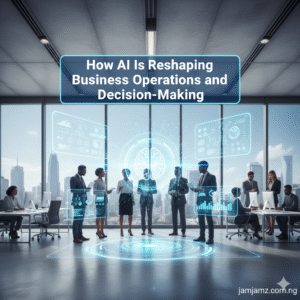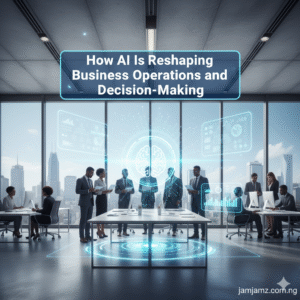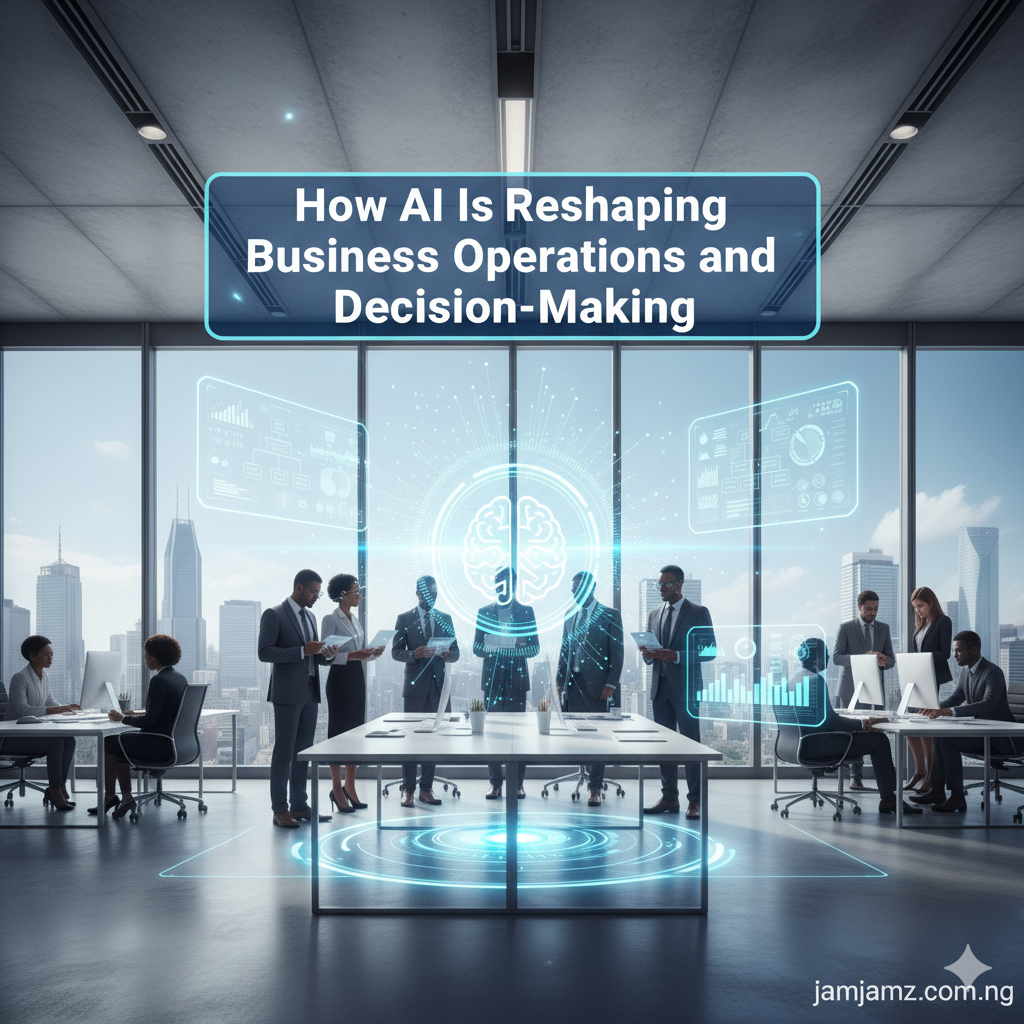How AI Is Reshaping Business Operations and Decision-Making
Artificial intelligence has changed how modern businesses work, plan, and grow. What started as a niche technology has become a core element of how companies operate and make decisions. From streamlining production lines to improving marketing strategies, AI drives efficiency, accuracy, and speed. Organizations that adapt to this shift gain an edge in innovation, while those that resist risk being left behind.
AI in business operations no longer means simple automation. It now represents a shift in how people and machines work together to create smarter, data-driven enterprises. Every part of an organization from supply chain to finance benefits from the strategic use of AI tools.

The Evolution of AI in Business
The journey of AI in business started with automation that handled repetitive tasks. Over time, machine learning, natural language processing, and deep learning allowed AI to analyze vast data sets, recognize trends, and predict future outcomes. This evolution changed business from reactive to proactive.
Today, AI doesn’t just support human decisions; it strengthens them. It provides insights faster than any human team could generate. Executives now make decisions based on real time data rather than historical reports. This new way of thinking creates agility, helping companies adapt to market changes instantly.
Businesses that understand AI’s value use it to improve every process. Whether through smarter forecasting, automated workflows, or improved customer engagement, AI shapes the foundation of tomorrow’s enterprise.
ALSO READ: Tech Giants vs. Startups: The New Innovation War in Silicon Valley
ALSO READ: How to Get Accepted into Top Universities in the U.S Without Stress
AI’s Impact Across Business Operations
AI influences every department of an organization. Each area experiences measurable improvement through automation, analytics, and smarter decision-making.
1. Operations and Process Optimization
AI analyzes large operational data sets to detect inefficiencies and improve performance. Machine learning models can predict when machines need maintenance, identify workflow delays, and suggest faster methods. These systems constantly learn and adjust, leading to continuous improvement.
Companies now save millions by reducing downtime, waste, and human error. Through AI-driven automation, businesses run 24/7 without burnout or mistakes, ensuring smooth and efficient operations.
2. Supply Chain and Logistics
The supply chain industry has undergone a complete transformation through AI. Algorithms forecast demand, optimize shipping routes, and manage warehouse operations in real time. Predictive tools analyze market conditions, weather patterns, and supplier data to avoid potential disruptions.
These capabilities create more resilient supply networks and reduce costs. Businesses that use AI logistics solutions deliver faster and maintain inventory levels that match customer demand perfectly.
3. Human Resources and Talent Management
AI helps HR departments recruit, train, and retain top talent. Intelligent platforms analyze resumes and job applications to identify ideal candidates. They assess skills, experience, and even personality traits to find employees who align with company culture.
During employment, AI tracks performance metrics, provides personalized training suggestions, and enhances employee engagement. By automating repetitive HR tasks, companies allow HR teams to focus on strategy, leadership, and employee well-being.
4. Finance and Accounting
AI revolutionizes financial management by improving accuracy, reducing risk, and forecasting outcomes. Machine learning algorithms detect fraud, analyze spending patterns, and predict cash flow. Automation tools generate financial reports in seconds, ensuring compliance and consistency.
These technologies help finance leaders make informed investment decisions and optimize resources. Real-time insights replace guesswork, allowing organizations to allocate funds strategically and react quickly to market changes.
5. Marketing and Customer Engagement
AI empowers marketing teams to connect with audiences more effectively. Predictive analytics identifies customer behavior patterns and buying intent. AI-driven content personalization delivers tailored messages that increase engagement and sales.
Chatbots and virtual assistants now handle millions of customer interactions daily. They provide instant support, improving satisfaction and freeing human agents for complex issues. With AI, companies understand customers better and build stronger relationships based on trust and value.
Data: The Power Behind AI Decisions
Data is the core of every AI-driven system. Businesses collect massive amounts of information from transactions, customer interactions, and digital platforms. AI transforms that raw data into insights that drive smarter decisions.
Machine learning tools recognize trends and correlations that humans might overlook. This helps companies anticipate challenges and opportunities before they occur. Retailers forecast seasonal demand, financial institutions predict market behavior, and manufacturers plan production cycles accurately.
Organizations that treat data as a strategic asset gain a competitive advantage. AI doesn’t just analyze information; it turns data into a predictive guide for future success.
Predictive Analytics and Strategic Planning
Predictive analytics allows companies to look ahead with confidence. By studying patterns in historical and real-time data, AI models forecast outcomes with high precision.
In business, this means understanding what customers will buy, when equipment will fail, or how the market will shift. Predictive systems support decisions in sales, operations, and finance. They remove uncertainty and let leaders act based on facts, not assumptions.
The ability to anticipate the future defines modern business success. AI gives organizations that foresight.
Automation and Productivity Gains
Automation represents one of the most visible transformations AI brings. Intelligent systems handle repetitive tasks faster and more accurately than humans. Employees focus on creativity and problem-solving while AI manages scheduling, reporting, and communication.
Robotic process automation, or RPA, eliminates human error in data entry and compliance tasks. Manufacturers use robots to assemble products with precision. Offices rely on AI tools to process invoices, schedule meetings, and send reports.
Automation increases productivity, lowers costs, and allows scalability without increasing staff. Businesses become more agile and efficient, unlocking growth potential previously limited by manual processes.
AI in Decision-Making: Smarter Choices at Every Level
AI strengthens decision-making across all business layers. From executives to department heads, data-backed insights guide strategy and execution.
Leaders use AI models to test different business scenarios. They can simulate market fluctuations, analyze risk, and choose the most profitable path forward. These insights reduce human bias and improve confidence in every decision.
AI also supports real-time decision-making. For example, e-commerce companies adjust pricing dynamically based on customer behavior and competitor activity. Manufacturers modify production schedules according to supply trends. The result is a more responsive, intelligent business structure.
Customer Experience and AI Personalization
Customer experience defines brand success. AI enables hyper-personalization by studying behavior, preferences, and feedback. Companies use these insights to create customized journeys for every client.
Recommendation engines suggest products customers are most likely to buy. AI-driven marketing platforms send the right message at the right time, increasing conversion rates. In service departments, AI chatbots handle common issues instantly, ensuring satisfaction.
AI also monitors sentiment on social media, identifying brand perception in real time. This allows businesses to adapt communication strategies and maintain a positive image.
Personalized experiences lead to loyalty, repeat purchases, and word-of-mouth growth.
AI in Risk Management and Security
AI plays a vital role in managing risk and ensuring data security. Machine learning systems detect unusual activities in financial transactions, employee actions, or customer accounts. These alerts prevent fraud, theft, and breaches before they cause damage.
Cybersecurity has evolved through AI integration. Advanced threat detection systems study attack patterns and predict future intrusions. Businesses use these systems to strengthen defense and safeguard digital assets.
By automating risk assessment, AI allows faster, more accurate protection. Organizations stay secure while maintaining smooth operations.
The Human and AI Partnership
The most powerful businesses don’t view AI as a replacement for people but as a partner. When employees work with AI tools, their productivity and creativity multiply. Humans bring empathy, ethics, and strategic thinking; AI brings speed, precision, and scalability.
Companies that invest in human-AI collaboration see better outcomes. Training staff to understand and manage AI tools encourages innovation and builds confidence. This balance creates a culture where people and technology grow together.
Instead of competing, humans and machines complement each other forming the foundation of intelligent enterprise.
Barriers to AI Adoption
Despite AI’s benefits, companies still face obstacles during implementation. High costs, limited technical expertise, and data quality issues often slow progress. Many organizations also struggle with ethical questions, such as data privacy and algorithm bias.
To succeed, leaders must set clear goals and invest in training. Businesses that integrate AI responsibly gain long-term advantages, while those that delay risk falling behind.
AI adoption works best when companies combine innovation with integrity.
Ethical and Responsible AI
Ethics shape the future of artificial intelligence. Responsible AI ensures that systems remain transparent, fair, and accountable. Businesses must use data responsibly, avoid bias, and ensure algorithms treat all users fairly.
Companies that focus on ethical AI build trust with consumers, investors, and employees. They avoid reputational damage and create technology that benefits society.
Responsible innovation protects both brand value and human dignity.

The Future of AI in Business Operations
The next stage of AI integration will move beyond efficiency toward creativity. Future systems will not only automate but also inspire innovation.
Businesses will use AI to create sustainable supply chains, personalize every customer experience, and forecast market shifts months in advance. Predictive governance and AI ethics boards will ensure transparency.
AI will soon play a role in environmental management, healthcare planning, and economic forecasting. As systems grow more intelligent, they will collaborate directly with human teams to make global operations smoother and more sustainable.
The future belongs to organizations that understand AI as a strategic partner. They will not only thrive but lead in an increasingly data-driven economy.
Case Examples of AI Transformation
Several industries show how deeply AI can reshape operations:
-
Retail: Predictive analytics improves stock management and pricing strategy.
-
Finance: AI algorithms detect fraud and optimize trading decisions.
-
Healthcare: Machine learning models predict patient outcomes and manage treatment plans.
-
Manufacturing: Automated systems predict maintenance and minimize downtime.
Each example proves that AI’s adaptability fits every business model, no matter the size or industry.
Conclusion
Artificial intelligence has become the backbone of modern business transformation. It enhances efficiency, accuracy, and speed across operations. From forecasting and automation to risk management and marketing, AI empowers companies to make better decisions every day.
The role of AI in business operations extends far beyond technology. It represents a mindset of innovation, adaptability, and collaboration. Businesses that embrace AI not only optimize performance but redefine how success looks in the digital age.
The partnership between humans and machines defines the future of work. AI doesn’t replace human intelligence it amplifies it. Together, they create smarter, faster, and more agile enterprises ready for any challenge.
